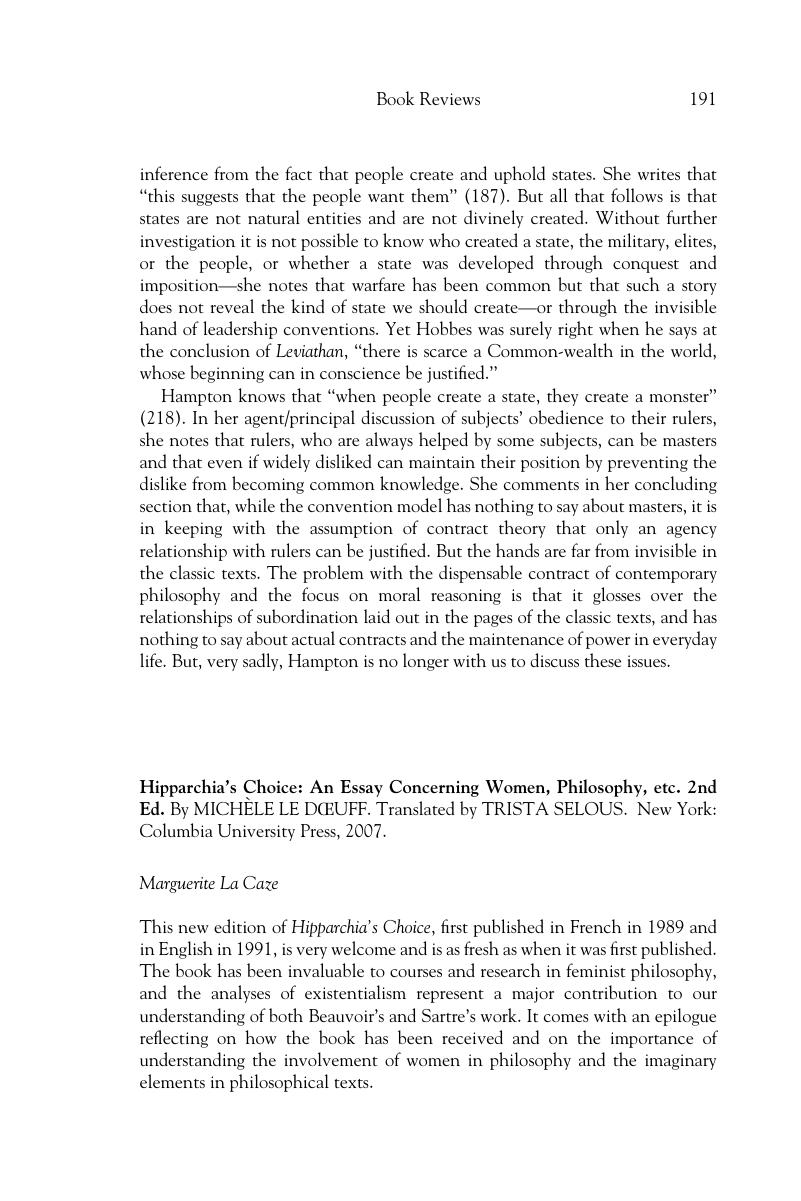No CrossRef data available.
Article contents
Hipparchia's Choice: An Essay Concerning Women, Philosophy, etc. 2nd Ed. By MichÈle Le DŒuff. Translated by Trista Selous. New York: Columbia University Press, 2007.
Published online by Cambridge University Press: 25 March 2020
Abstract
An abstract is not available for this content so a preview has been provided. Please use the Get access link above for information on how to access this content.

- Type
- Book Reviews
- Information
- Hypatia , Volume 24 , Issue 1: Special Issue: Oppression and Moral Agency: Essays in Honor of Claudia Card , Winter 2009 , pp. 191 - 195
- Copyright
- Copyright © 2009, Hypatia, Inc.
References
Anderson, Pamela Sue. 1998. A feminist philosophy of religion: The rationality and myths of religious belief. Oxford: Blackwell.Google Scholar
Arens, Katherine. 1995. Between Hypatia and Beauvoir: Philosophy as discourse. Hypatia 10 (4): 46–75.CrossRefGoogle Scholar
Beauvoir, Simone de. 1983. The second sex, Trans. H. M. Parshley. London: Penguin. (Le deuxième sexe. 2 vols. Paris: Gallimard, 1949.)Google Scholar
David, Anthony. 1997. Le Dœuff and Irigaray on Descartes. Philosophy Today 41 (3–4): 367–82.CrossRefGoogle Scholar
Deutscher, Max, ed. 2000. Operative philosophy and imaginary practice: Michèle Le Dœuff. Amherst, N.Y.: Humanity Books.Google Scholar
Deutscher, Penelope. 1997. French feminist philosophers on law and public policy: Michèle Le Dœuff and Luce Irigaray. Australian Journal of French Studies 34 (1): 24–44.CrossRefGoogle Scholar
Fornasiero, Jean and Sankey, Margaret eds. 2003. Autour de Michèle Le Dœuff. Australian Journal of French Studies 40 (3).Google Scholar
Goulimari, Pelagia. 1999. A minoritarian feminism? Things to do with Deleuze and Guattari. Hypatia 14 (2): 97–120.CrossRefGoogle Scholar
Grimshaw, Jean. 1996. Philosophy, feminism, and universalism. Radical Philosophy 76: 19–28.Google Scholar
Grosz, Elizabeth. 1989. Sexual subversions: Three French feminists. Sydney: Allen & Unwin.Google Scholar
Kail, Michel. 2002. Michèle Le Dœuff: Une philosophie à l’œuvre. Les Temps modernes 619: 144–162.CrossRefGoogle Scholar
La Caze, Marguerite. 2002. The analytic imaginary. Ithaca, N.Y.: Cornell University Press.Google Scholar
Le Dœuff, Michèle. 1989. The philosophical imaginary. Trans. Colin Gordon. London: Athlone Press. (Recherches sur l'imaginaire philosophique, Paris: Payot, 1980.)Google Scholar
Le Dœuff, Michèle. 1991. Hipparchia's choice: An essay concerning women, philosophy, etc. Trans. Trista Selous. Oxford: Blackwell. (L'Etude et le rouet, Paris: Les Editions du Seuil, 1989.)Google Scholar
Le Dœuff, Michèle. 2003. The sex of knowing. Trans. Kathryn Hamer and Lorraine Code. London: Routledge. (Le sexe du savoir, Paris: Aubier, 1998.)Google Scholar
Lehtinen, Virpi. 2007. On philosophical style: Michèle Le Dœuff and Luce Irigaray. European Journal of Women's Studies 14 (2): 109–125.CrossRefGoogle Scholar
Lloyd, Genevieve. 2000. Feminism in history of philosophy: Appropriating the past. In The Cambridge companion to feminism in philosophy, ed. Fricker, Miranda and Hornsby, Jennifer. Cambridge: Cambridge University Press, 245–263.CrossRefGoogle Scholar
Morris, Meaghan. 1988. Operative reasoning: Reading Michèle Le Dœuff. In The pirate's fiancée: Feminism, reading, postmodernism. London: Verso, 71–102.Google Scholar
Paddle, Sarah. 1991. Ideology and culture: Towards feminist cultural history. Hecate 17 (1): 7–14.Google Scholar
Sartre, Jean‐Paul. 2003. Being and nothingness: An essay on phenomenological ontology. Trans. Hazel E. Barnes. London: Routledge. (L’Être et le néant, Paris: Gallimard, 1943.)Google Scholar




